
How to Care for a Ceramic Knife
by NanLT
Ceramic knives are a worthwhile investment for the home cook. Learn how to take care of your ceramic knife so it can last a lifetime.
A Good Knife Will Save Hours of Grief
Take Care of Your Ceramic Kitchen Knife
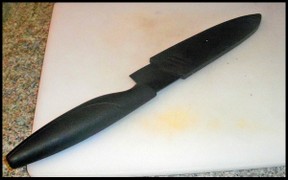 As a home cook I know the important of having a good set of knives on hand to use. Using the right knife for the right job makes things so much easier, and safer.
As a home cook I know the important of having a good set of knives on hand to use. Using the right knife for the right job makes things so much easier, and safer.
Trouble comes when you try to use the wrong knife for a job or when you allow your knives to become blunted and dull.
What if there was a knife that didn't become dulled easily though? A knife that with care could retain its sharp edge for years?
Such a knife does exist. Ceramic knives have been around since around 2005, and now that costs are coming down they're affordable even for the home cook.
I've been wanting a ceramic knife ever since I first saw one being used nearly 10 years ago. Now, I own 3 and they are quickly becoming my most favourite to use. They can be a bit daunting at first because they are incredibly sharp, more sharp than any blade you may have used previously. And that means taking extra care when using and cleaning a ceramic knife.
Image @NanLT
Ceramic Knives - What's the Big Deal?
Why Ceramic Knives Are So Good
Ceramic knives have become popular with professional chefs over the past decade. As production methods improve and prices come down, the knives are becoming equally popular with enthusiastic home cooks.
Ceramic Knives are Hard
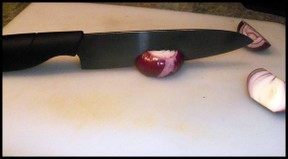 A ceramic knife is made using zirconium dioxide. During the production process, the ceramic blade reaches a hardness of 8.5 on the Mohs Scale of Mineral Hardness. By comparison, a standard hardened steel knife knife has a hardness of 6.5 and a diamond has a hardness of 10. Because of this hardness a ceramic knife blade can hold an edge over years of daily use without resharpening.
A ceramic knife is made using zirconium dioxide. During the production process, the ceramic blade reaches a hardness of 8.5 on the Mohs Scale of Mineral Hardness. By comparison, a standard hardened steel knife knife has a hardness of 6.5 and a diamond has a hardness of 10. Because of this hardness a ceramic knife blade can hold an edge over years of daily use without resharpening.
Image @NanLT
Ceramic Knives are Chemically Inert
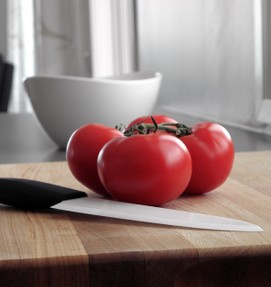 The pores in the ceramic blade are so small that the knife won't absorb odours from foods while slicing. No more transferring the flavour and smell from the garlic you chopped earlier to the apple you're slicing now. The knife won't react to the acids in foods such as tomatoes or lettuce, meaning you won't get the discolouration and browning which can sometimes occur with stainless steel blades.
The pores in the ceramic blade are so small that the knife won't absorb odours from foods while slicing. No more transferring the flavour and smell from the garlic you chopped earlier to the apple you're slicing now. The knife won't react to the acids in foods such as tomatoes or lettuce, meaning you won't get the discolouration and browning which can sometimes occur with stainless steel blades.
Image from Flicker by Tsaarni under creative commons license, attribution 2.0
The Making of a Ceramic Knife
from zirconia to razor sharp blade
The Do's of Ceramic Knife Care
Making the best use of your knife
- Use the ceramic knife for slicing boneless meats, fruits, and vegetables
- If used for chopping, hold the tip down and use with a pivoting motion
- Use with a wood or plastic cutting board
- Store in a conventional wooden knife block or in the packaging
- Hand wash using a damp cloth or dish soap and water.
The Don'ts of Ceramic Knife Care
These actions could ruin your knife
- Don't use like a cleaver
- Don't use with a prying or twisting motion
- Don't put in the dishwasher
- Don't use on a marble or stone cutting board
- Don't use for cutting bone or other hard substances
Ceramic Knife in Protective Sheath
Black bladed ceramic knife
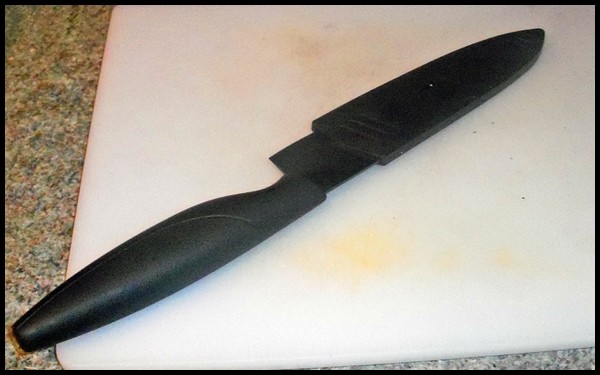 Black ceramic knife in sheath Image by NanLT |
Have you heard of ceramic knives?
And would you like to own one?
Purchase a Ceramic Knife Today
An investment of a lifetime
 |  |  |
| Kyocera Revolution Series Paring and ... Only $85.0 | Shenzhen Knives Chef Series. Ceramic ... Only $18.55 | Kyocera Revolution Series 7-Inch Prof... Only $93.0 |
Keeping the Ceramic Knife Blade Sharp
How and When to Sharpen a Ceramic Knife
With proper care, a ceramic knife will only need to be sharpened every few years. Most manufacturers recommend returning the knife to be sharpened and many will include this as part of the guarantee for the knife.If you can't return it to the manufacturer, then take it to a qualified knife shop which uses a diamond coated sharpening wheel.
If you do opt to sharpen your own ceramic knives, be sure to purchase a good quality sharpener and use it as directed.
Always Use a Good Quality Sharpener for Ceramic Knives
4-Star Average Review at Amazon
 | Kyocera Electric Diamond Knife Sharpener for Kyocera Ceramic Knifes Battery powered, this electric ceramic knife sharpener is the perfect solution for at-home resharpening and refreshening of your ceramic kitchen knives. Ideal for Kyocera ... Only $59.95 |
You might also like
Imperia Pasta MachineIf you want to make home made pasta you need Imperia Pasta Factory machine. I...
Pie Birds and How to Use ThemAlso referred to as pie funnels or pie vents, pie birds allow steam to escape...
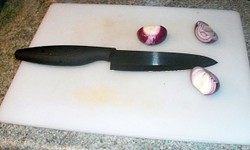


 Bromley Council Recycleson 12/19/2013
Bromley Council Recycleson 12/19/2013
 Clean Your House With Just 3 Natural Ingredientson 12/18/2013
Clean Your House With Just 3 Natural Ingredientson 12/18/2013
 Growing Up in Smalltown Americaon 12/17/2013
Growing Up in Smalltown Americaon 12/17/2013
 What Makes Me An Organised Mumon 12/15/2013
What Makes Me An Organised Mumon 12/15/2013

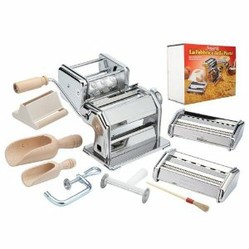
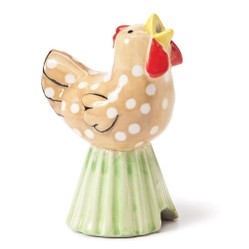
Let's Talk About Knives.
I never would have imagined that my lovely little white knife needs special care and I'm glad to read this information. Also glad to see I'm already treating mine properly. Glad the store I bought if from is managing to stay in business so I have someplace to take it to for resharpening.
Hi Cheryl - manufacturers of ceramic knives don't recommend sharpening ceramic knives yourself. A specialised tool is needed, and most suggest returning it to them to be sharpened. If you follow the instructions above regarding the care of your ceramic knife, it shouldn't need sharpening very often.
If you can't return it for sharpening, then your second best option is to find a speciality knife shop near you and ask if they have a diamond-coated sharpening wheel for ceramic blades.
My son sent me Ceramic knives from Norway. I am wondering if you could tell me where I could buy a knife sharpener if needed.
They definitely seem a lot more hygenic than ordinary knives